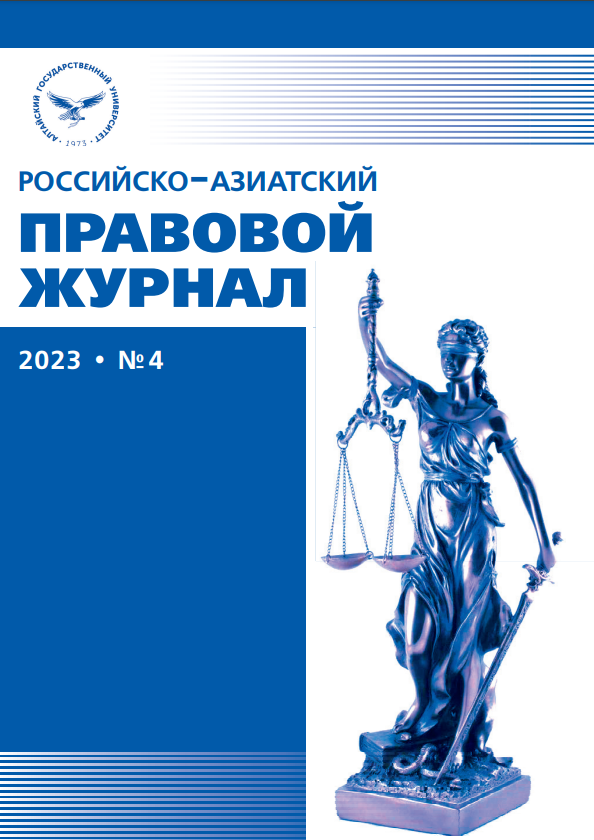FORMATION OF A SYSTEM OF OBJECTS OF CRIMINAL LAW PROTECTION IN THE THEORETICAL MODELING OF THE CRIMINAL LAW ON CRIMES IN THE FIELD OF ECONOMIC ACTIVITY
УДК 343.37 ББК 67.408.122
Abstract
Allocation of unified system-forming criteria for classification (generalization) of objects of criminallaw protection of economic activity (Chapter 22 of the Criminal Code of the Russian Federation). Usingthe methods of cognition: comparative analysis, dialectical, sociological, the author of the study coming to conclusions: 1) the current system of objects of criminal law protection is represented by extremely diversesocial relations, which should not infrequently be fixed in other chapters and sections of the criminallaw; 2) despite the variety of objects, it is possible to identify common grounds for combining all criminalencroachments into a common system, in this case it is necessary to take as a basis separate elements of socialrelations: the subject, the subject or the content. The author comes to the conclusion that harm is caused tothe subject of public relations in all cases, respectively, when determining the system of objects, it is necessaryto establish which element — the subject or content is the most significant for society, and accordingly, acriminal law protection regime is introduced in relation to it. The author of the scientific work proposes toestablish the “priority of protection” in relation to the most significant element of public relations. Such anapproach will allow us to achieve several independent, significant goals: to systematize the total volumeof objects of criminal legal protection, to identify criminal encroachments that are not related to economiccrimes, to develop unified legal and technical rules and models for formulating the disposition of criminallaw norms. The work is theoretical in nature and is aimed at developing a fundamental model for reformingthe criminal legislation of the Russian Federation on responsibility for crimes in the sphere of economicactivity, both within the framework of the current Criminal Code of the Russian Federation, and in the caseof the development and adoption of a new criminal law
Downloads
References
Мотин О.А. Частный интерес в системе объектов уголовно-правовой охраны : автореф. … к. ю. н. Волгоград, 2005. С. 14.
Комментарии к Уголовному кодексу РФ / Ю.В. Грачева и др., отв. ред. А.И. Рарог; 9-е изд., перераб. и доп. М., 2013. С. 397.
Лавричев В.Д., Исаев О.Ю. Родовой и видовой объекты преступлений, совершаемых на ранних стадиях криминального установления контроля над управлением и активами предприятия // Библиотека криминалиста. 2013. №6 (11). С. 139.
Лопашенко Н.А. Преступления в сфере экономической деятельности: теоретический и прикладной анализ : монография; в 2-х ч. М. 2015. Ч. 2. С. 31.
Голунский А., Строгович М. Теория государства и права. М., 1940. С. 227.
Наумов А.В., Новиченко А.С. Законы логики при квалификации преступлений. М., 1978. С. 4–8.
Клепицкий И.А. Система хозяйственных преступлений. М., 2007. С. 509.
Макаров А.В., Жукова А.С. Преступления в сфере внешнеэкономической деятельности на современном этапе развития отечественного уголовного законодательства // Российский следователь. 2015. №24. С. 29.
Бойко А.И. Преступное бездействие : монография. СПб., 2011. С. 97.
По делу о проверке конституционности ч. 8 ст. 4 и ч. 2, 3 и 4 ст. 9 Федерального закона «Об особенностях отчуждения недвижимого имущества, находящегося в государственной собственности субъектов Российской Федерации или в муниципальной собственности и арендуемого субъектами малого и среднего предпринимательства, и о внесении изменений в отдельные законодательные акты Российской Федерации» в связи с жалобой администрации города Благовещенска : Постановление Конституционного Суда РФ от 20.12.2010 №22-П // СПС Консультант Плюс.
Осипов М.Ю. Экономический механизм // Философия хозяйства. Альманах Центра общественный наук и экономического факультета МГУ им. Ломоносова. 2006. №4. С. 13.
Russian-Asian Law Journal is a golden publisher, as we allow self-archiving, but most importantly we are fully transparent about your rights.
Authors may present and discuss their findings ahead of publication: at scientific conferences, on preprint servers, in public databases, and in blogs, wikis, tweets, and other informal communication channels.
Russian-Asian Law Journal allows authors to deposit manuscripts (currently under review or those for intended submission) in non-commercial, pre-print servers such as ArXiv.
Authors who publish with this journal agree to the following terms:
- Authors retain copyright and grant the journal right of first publication with the work simultaneously licensed under a Creative Commons Attribution License that allows others to share the work with an acknowledgement of the work's authorship and initial publication in this journal.
- Authors are able to enter into separate, additional contractual arrangements for the non-exclusive distribution of the journal's published version of the work (e.g., post it to an institutional repository or publish it in a book), with an acknowledgement of its initial publication in this journal.
- Authors are permitted and encouraged to post their work online (e.g., in institutional repositories or on their website) prior to and during the submission process, as it can lead to productive exchanges, as well as earlier and greater citation of published work (See The Effect of Open Access).








